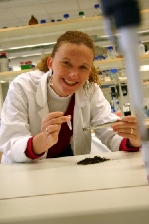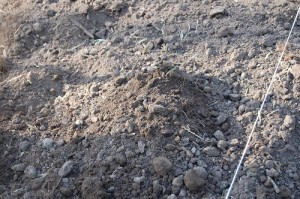 Here is an interesting story out of Lund University in Sweden. Nadia Skorupa Parachin has discovered an enzyme in garden soil that when used could increase ethanol production by 20 percent or more. Xylose is the second most common sugar found in nature, but today, is not commonly used, if at all, in the ethanol process.
Here is an interesting story out of Lund University in Sweden. Nadia Skorupa Parachin has discovered an enzyme in garden soil that when used could increase ethanol production by 20 percent or more. Xylose is the second most common sugar found in nature, but today, is not commonly used, if at all, in the ethanol process.
When Parachin tested her enzymes, her results showed that her enzymes bind xylose more efficiently than those enzymes that have been tested previously. She has recently patented her newly discovered enzymes.
“In order for carbohydrates in forestry, plant and waste products to be used for ethanol production, enzymes are required in the yeast that ‘eat up’ the sugar and convert it into ethanol,” said Parachin. “If we just want to make use of the glucose then normal baker’s yeast is sufficient. However, if the xylose is also to be converted to ethanol, then genetic modifications have to be made to the yeast.”
Parachin began by extracting DNA from a soil sample. She chose soil because it is considered the most diverse habitat on earth. Then she cut the DNA into small pieces. From there, she built up a DNA library. Next, she identified the most appropriate genes by coupling enzyme activity growth on xylose.
 She discovered that one gram of soil contain 10 billion bacteria. “Enzymes and other proteins are found in almost unlimited numbers and can have all sorts of unexplored properties. I collected the soil sample from a garden in Höör, but any soil can be used,” explained Parachin who notes that this process is not easy and that’s why she believes other researchers have not made this discovery.
She discovered that one gram of soil contain 10 billion bacteria. “Enzymes and other proteins are found in almost unlimited numbers and can have all sorts of unexplored properties. I collected the soil sample from a garden in Höör, but any soil can be used,” explained Parachin who notes that this process is not easy and that’s why she believes other researchers have not made this discovery.
Marie Gorwa-Grauslund, Parachin’s supervisor, was the first person to realize that this genetic technique, known as metagenomics and derived from the environmental studies discipline, could work in this specific context. The next step for the team is to apply their modified metagenomics technique in other areas, for example, to isolate enzymes that allow microorganisms to cope with difficult industrial conditions, such as high temperatures and high acid levels.
However, there is still more work to be done on the current research and the team hopes their method can make ethanol production more efficient and economically viable.

